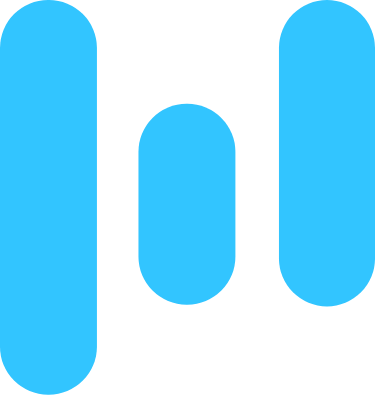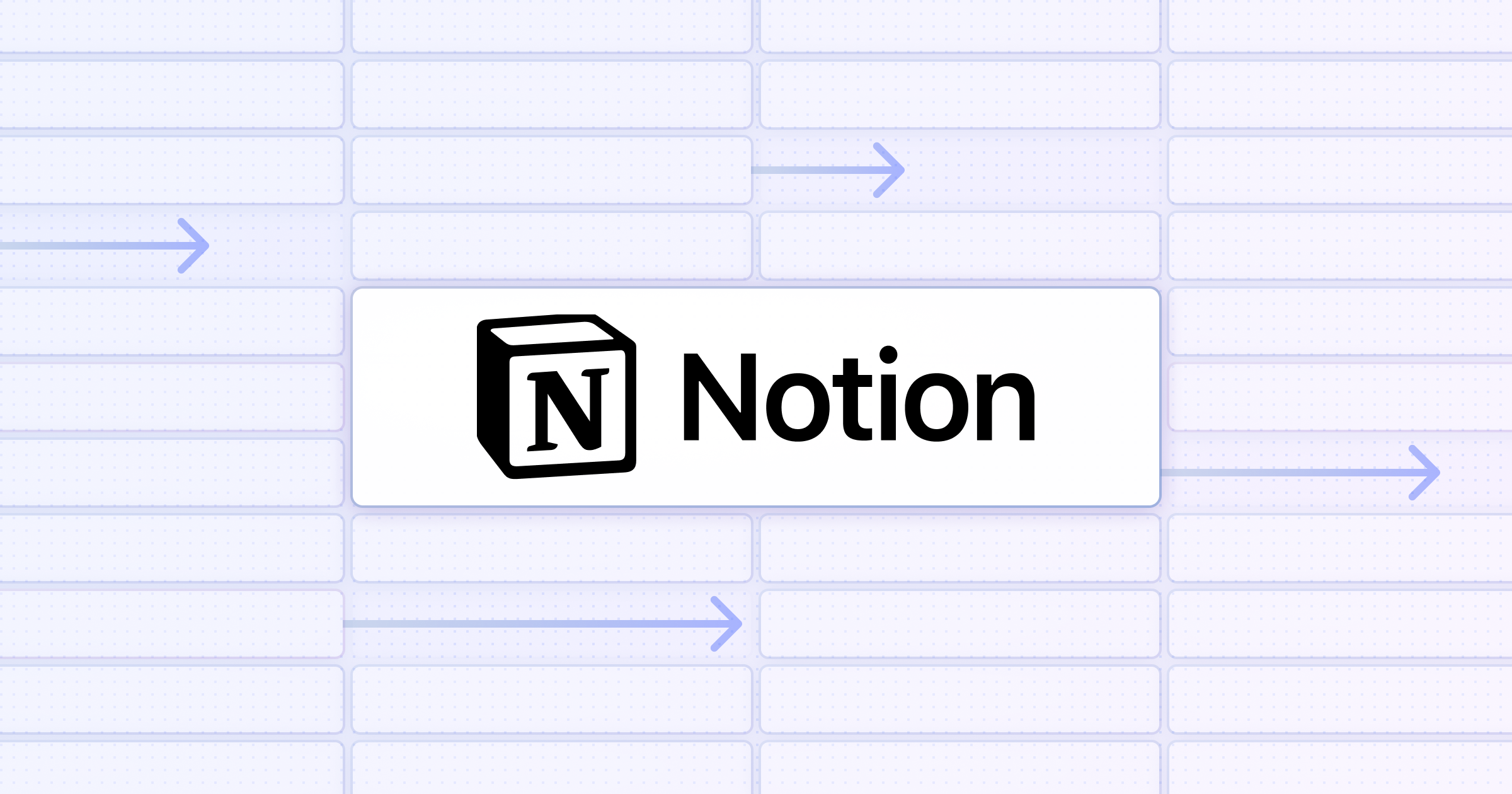
In a world where every second app promises to be a “digital Swiss Army Knife”, Notion really is one. It merges notes, tasks, databases and wikis into one versatile (surprisingly powerful) platform that can do just about anything if you’re willing to invest the time.
One popular Notion use case is building a Customer Relationship Management (CRM) system. You’re going to manage tasks and notes in Notion, why not manage relationships there too, hey?
In this guide, we'll walk you through setting up a CRM in Notion from scratch and show you how to take your CRM to the next level with Relay’s integrations and AI capabilities. Let’s dive in.
Why use Notion for your CRM?
Notion fans tend to try to build solutions for their problems in Notion when they should probably just use a dedicated tool. But using Notion as a CRM is one of its best use cases. Here’s why Notion stands out as a CRM:
- Flexibility. Notion’s building blocks allow you to design a CRM that aligns perfectly with your workflow, no matter how unique it might be.
- Ease of use. With its drag-and-drop interface, Notion makes database management feel like a breeze.
- All-in-one approach. Keep your team’s notes, tasks, and databases in one place, making it easier to manage customer relationships without juggling multiple apps.
- Cost-effectiveness. Especially for small teams or individual users, Notion can be a highly cost-effective solution, with free plans offering a wealth of features.
10 Best Notion CRM Templates
As we touched on above, Notion can be used effectively as a CRM, thanks to its versatility and adaptable tools like databases and Kanban boards.
The easiest way to get started? With a Notion CRM template.
Sure, you can spend hours building your own solution from scratch, but it's much easier (and faster) to get up and running with the help of the various templates available.
Here are some of the best Notion CRM templates that can help streamline your customer relationships and enhance your sales strategy:
1. CRM Tracker
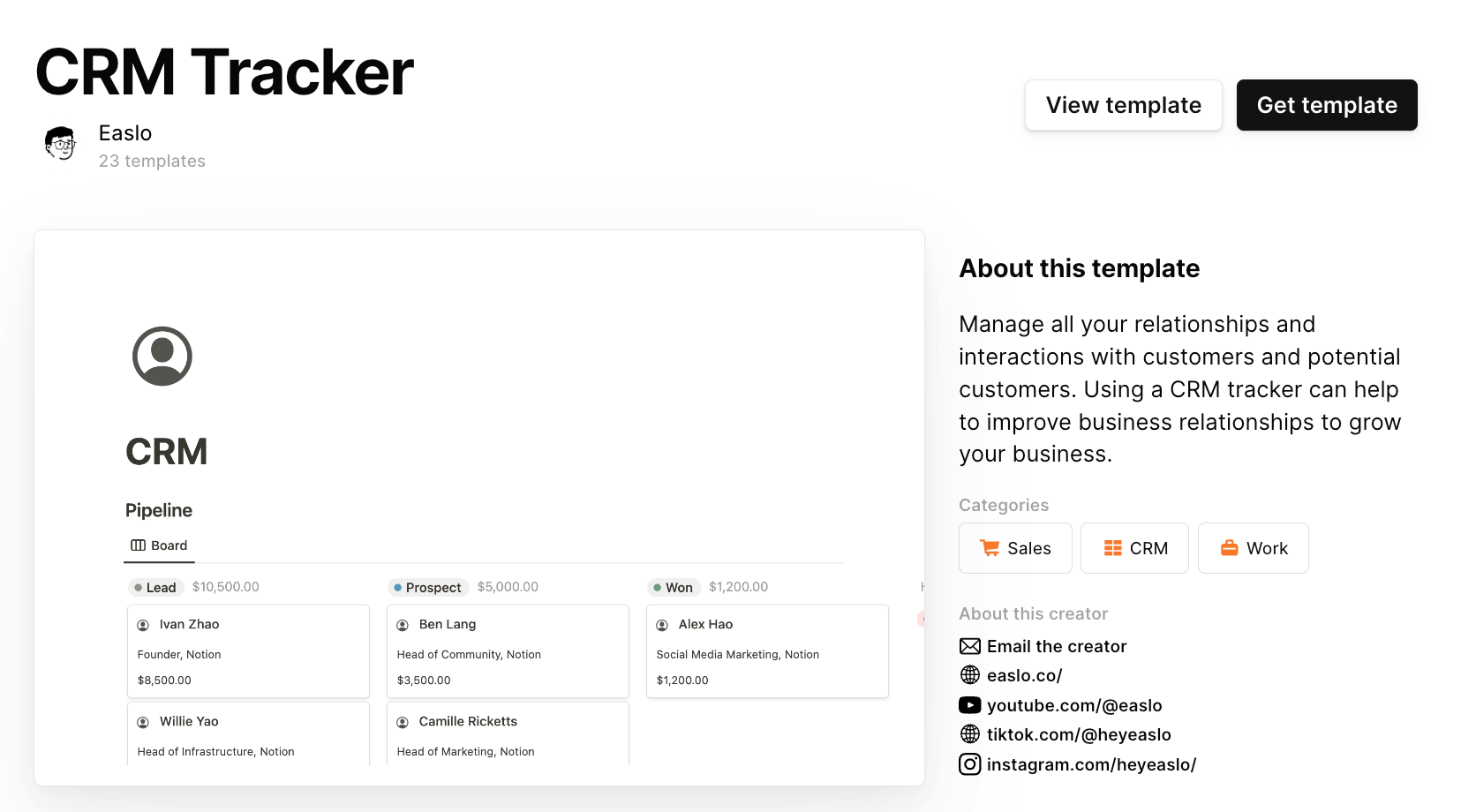
This CRM Tracker template in Notion mimics the structure of traditional relational CRMs, making it familiar and user-friendly for those who are accustomed to using more complex CRM systems. It's particularly beneficial for small to medium-sized organizations that may not have a large sales team or budget for an extensive CRM platform.
2. Ultimate CRM
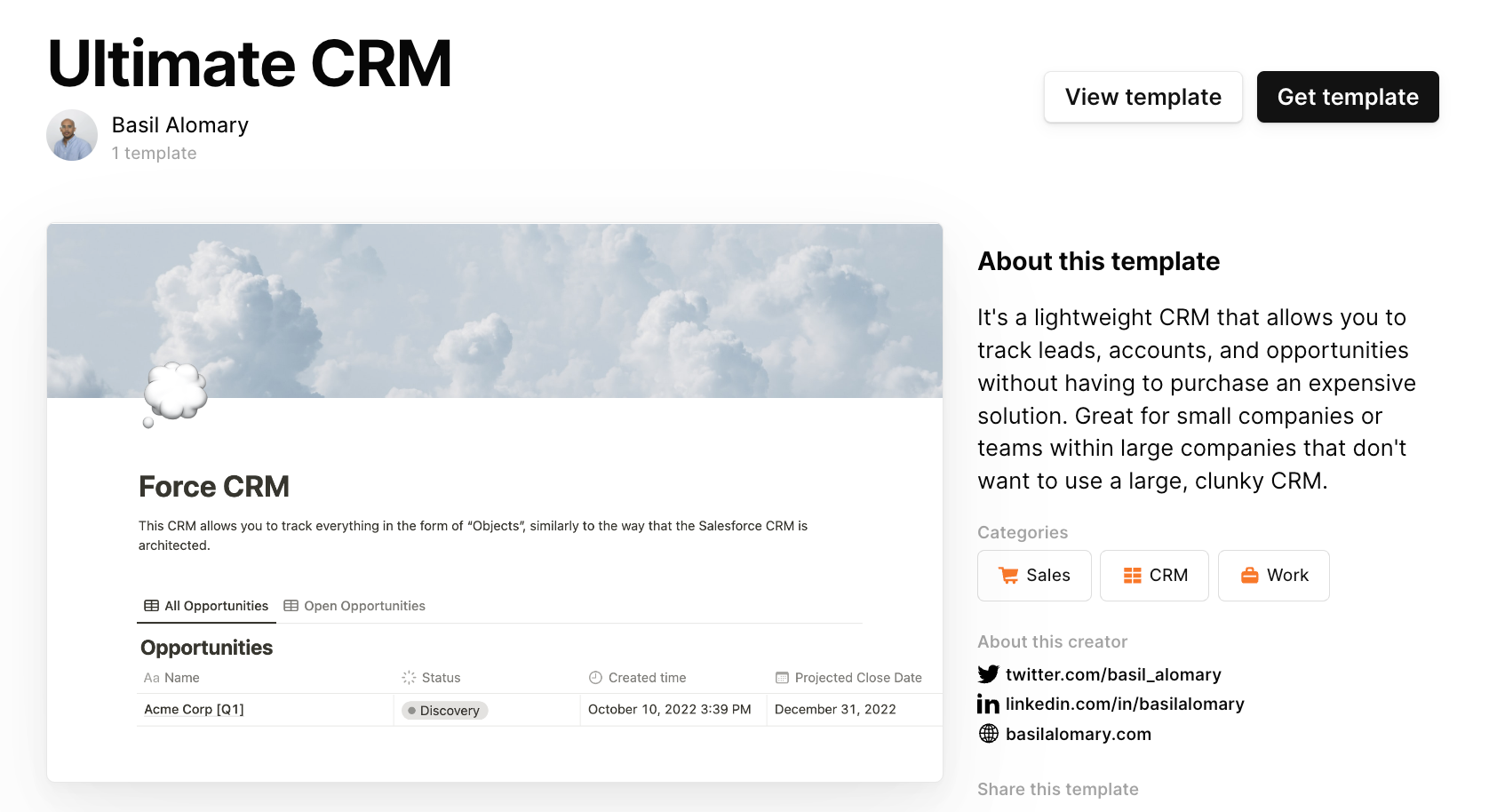
This "ultimate" CRM template offers ready-made solutions for organizing customer data, tracking sales progress, and managing daily operations. It can be customized to fit your unique requirements and help you stay organized and productive.
3. Sales CRM
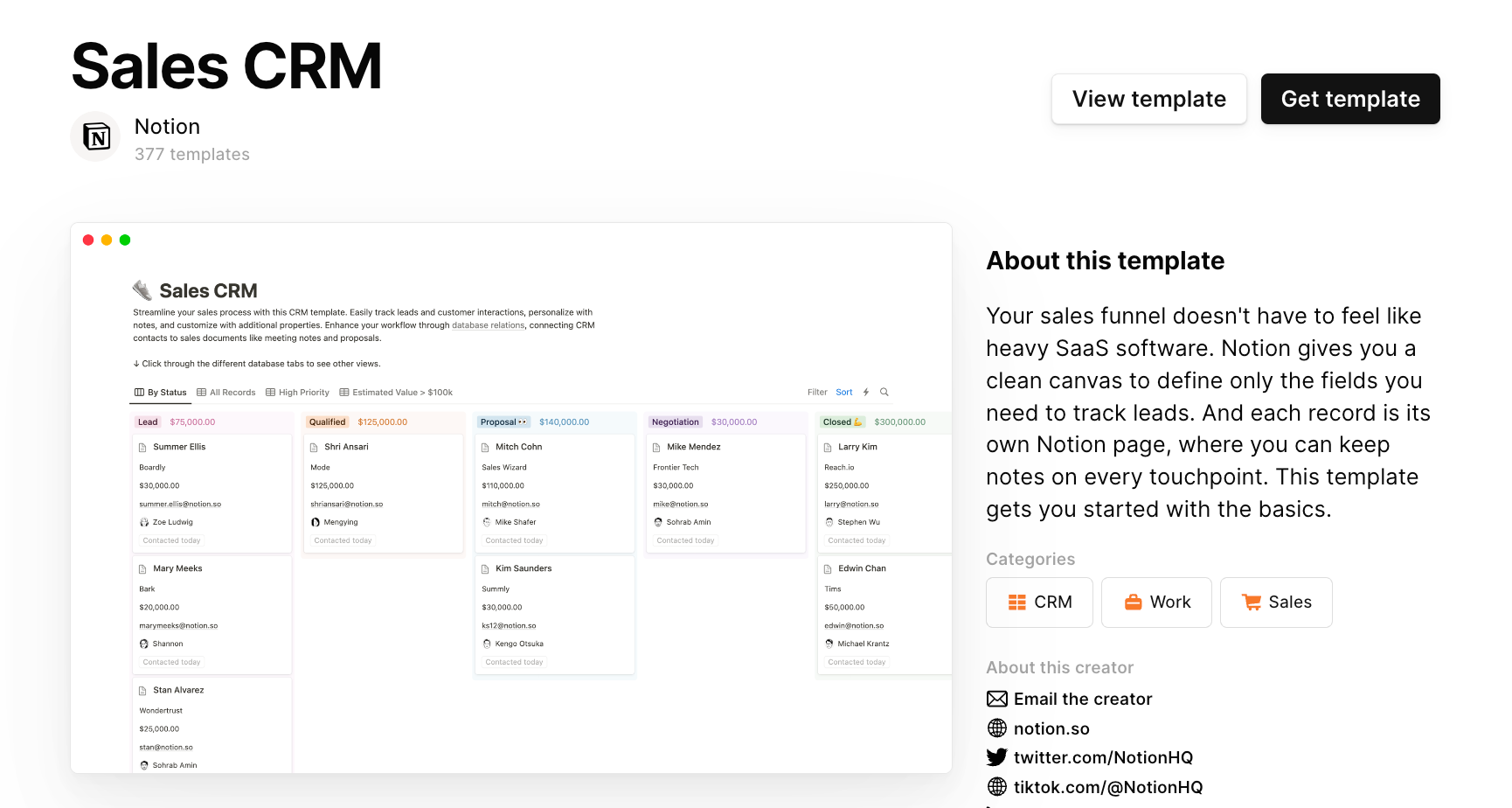
This CRM template is tailored specifically for sales teams, and help streamline processes, track leads, and ultimately drive more sales. This is set up with options to track leads, deals and customer interactions out of the gate.
Additionally, Notion's deep filtering options allow sales teams to quickly access the information they need, whether it's a list of high-priority leads or a summary of recent customer interactions.
4. Fundraising Database
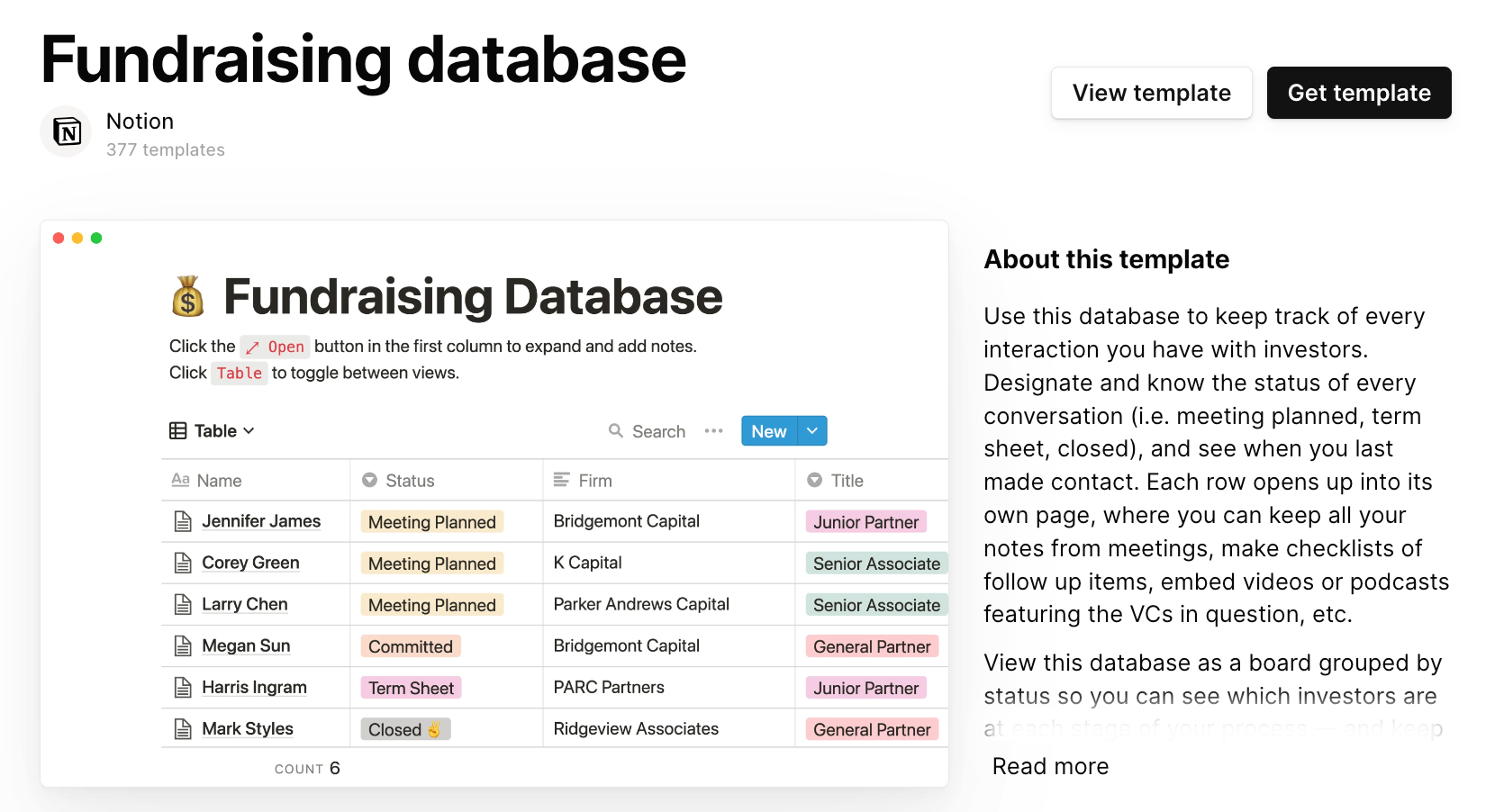
This template is set up and manage your fundraising database efficiently. You can use the database to keep track of investor interactions, with built-in status updated relevant to the industry (e.g. meeting planned, term sheet, closed). Each row opens a page where you can take meeting notes, embed resources and make checklists of follow-ups.
5. Sales Pipeline with Automations
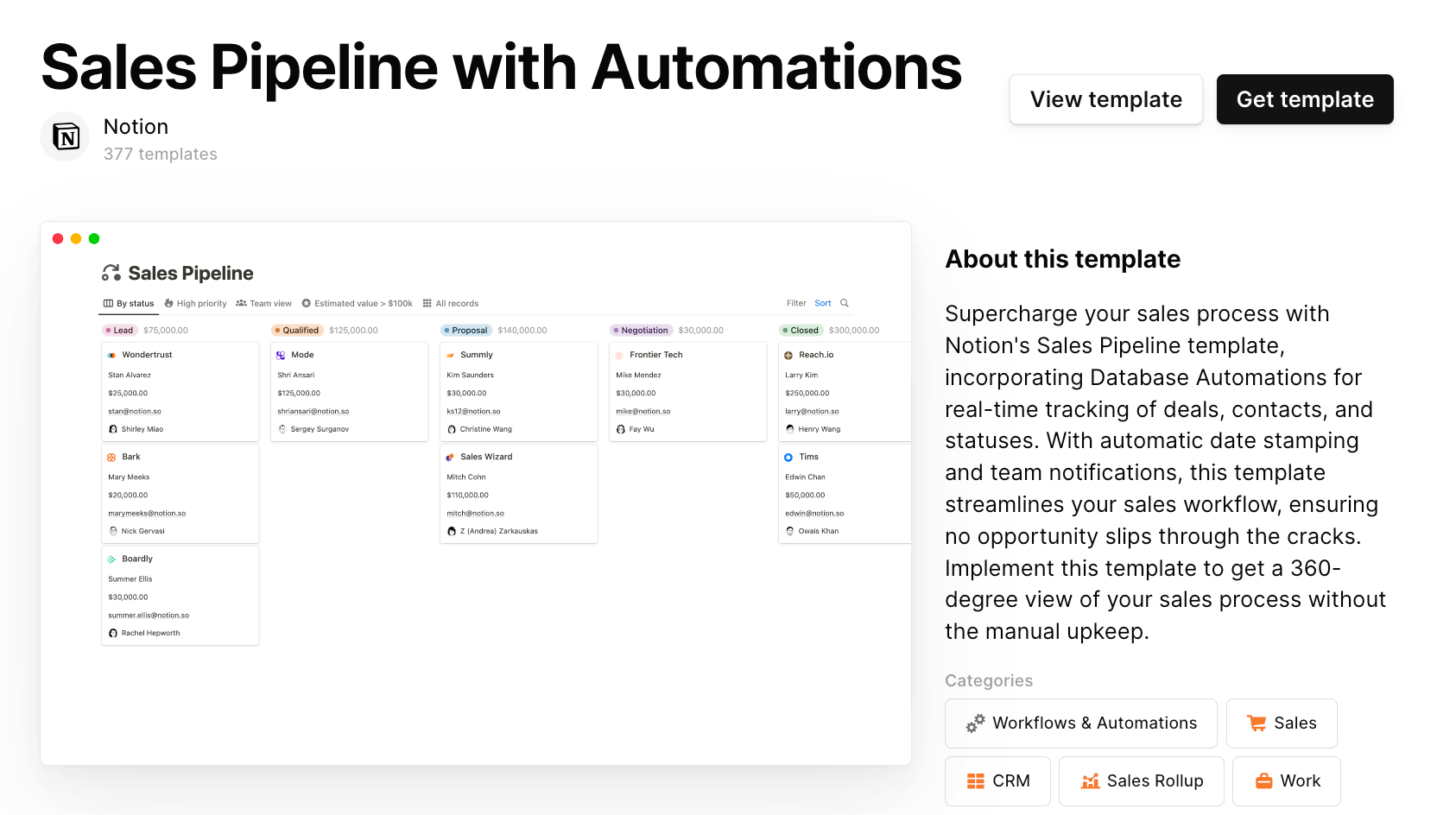
This CRM template is tailored for sales teams. It comes equipped with built-in automations that allow for real-time tracking of deals, updates to contact information, and status changes, streamlining the sales process and enhancing productivity.
6. Client CRM
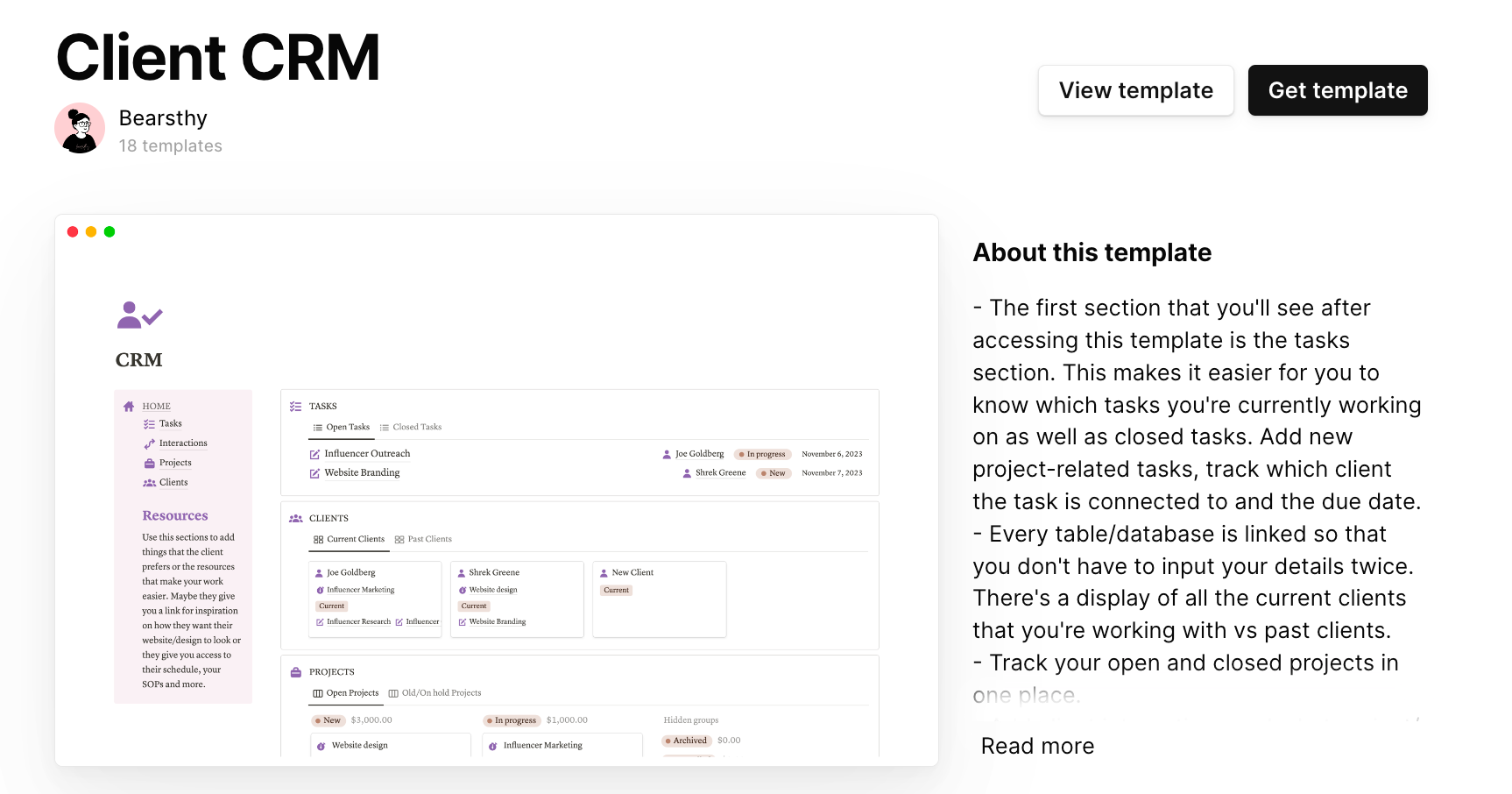
This free CRM template is ideal for managing client relationships. It provides a structured way to store and access client data, making it easier for service providers or freelancers to keep track of interactions and project details.
7. EntrepreneurOS
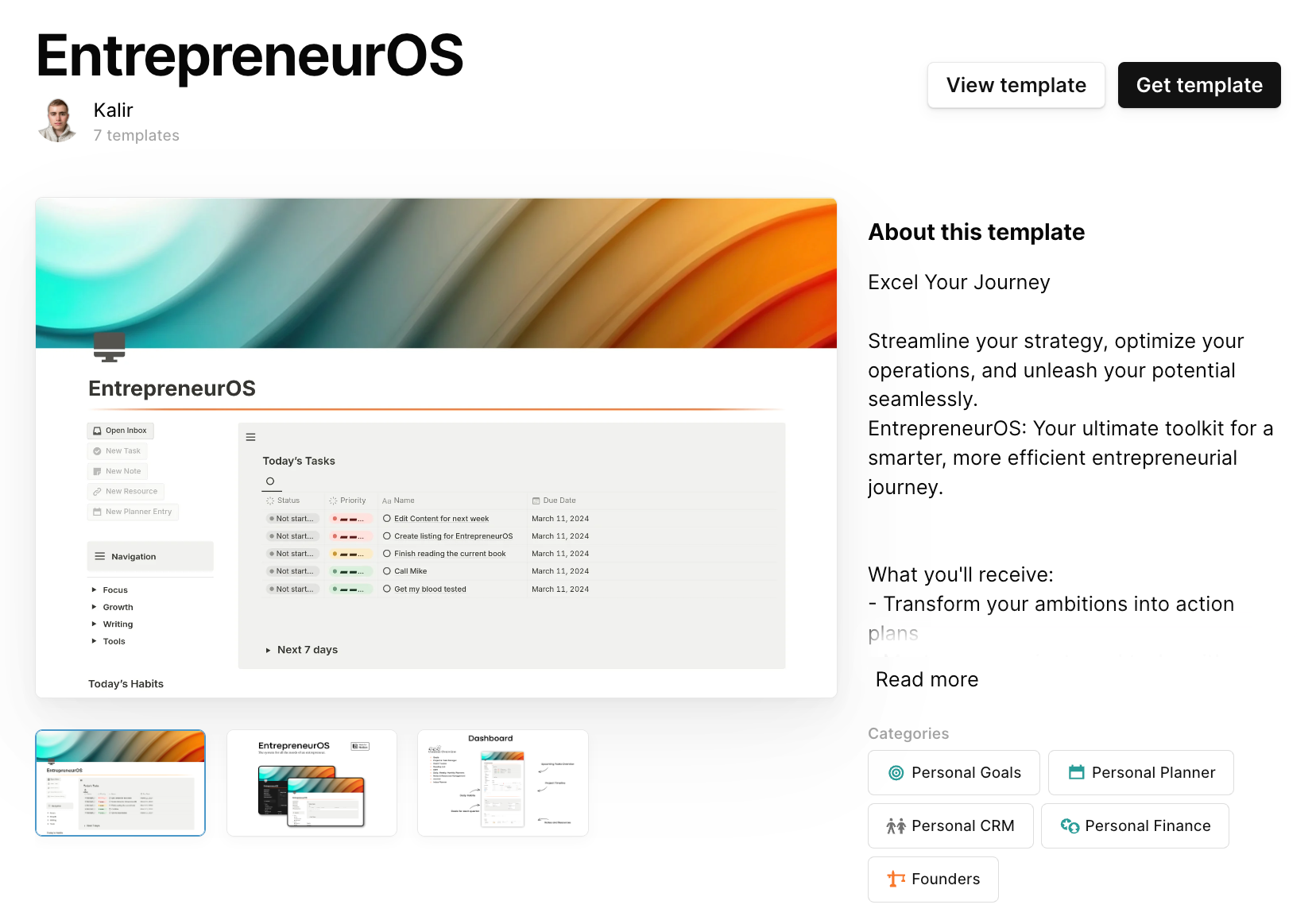
EntrepreneurOS is a comprehensive template for entrepreneurs looking to streamline their operations. It integrates various aspects of business management, including project tracking, financial planning, and customer interactions, all within a single Notion workspace.
8. Job hunting CRM
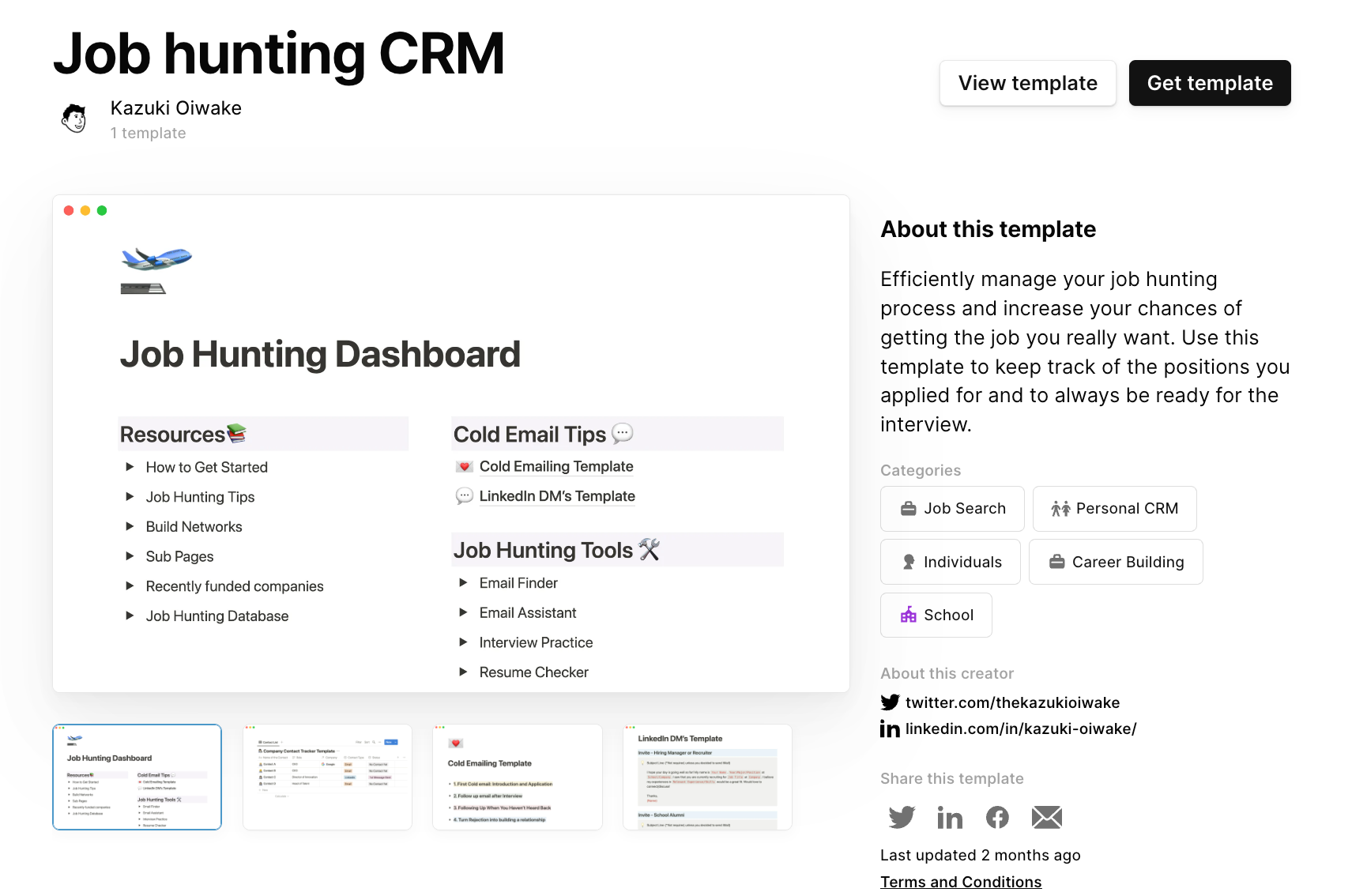
Developed by Kazuki Oiwake, this CRM template is designed to help job seekers manage their applications efficiently. It allows users to track job applications, follow-ups, and interviews, providing a structured approach to job hunting and increasing chances of landing a job.
9. Personal CRM
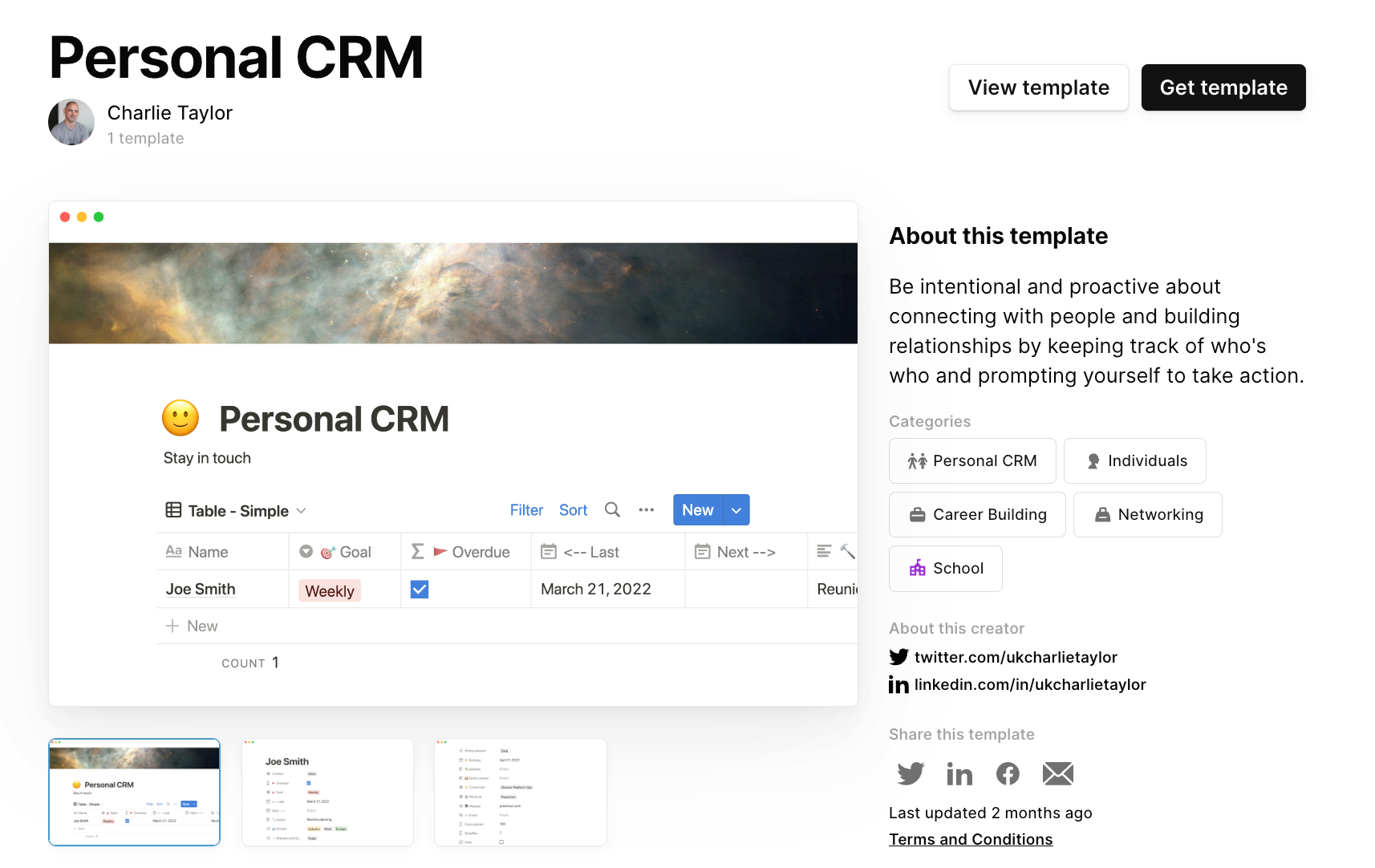
This template is perfect for personal use, helping individuals manage their professional and personal connections. It features tools for tracking interactions, setting reminders for follow-ups, and maintaining relationship details in an organized manner.
10. OptiOpp CRM
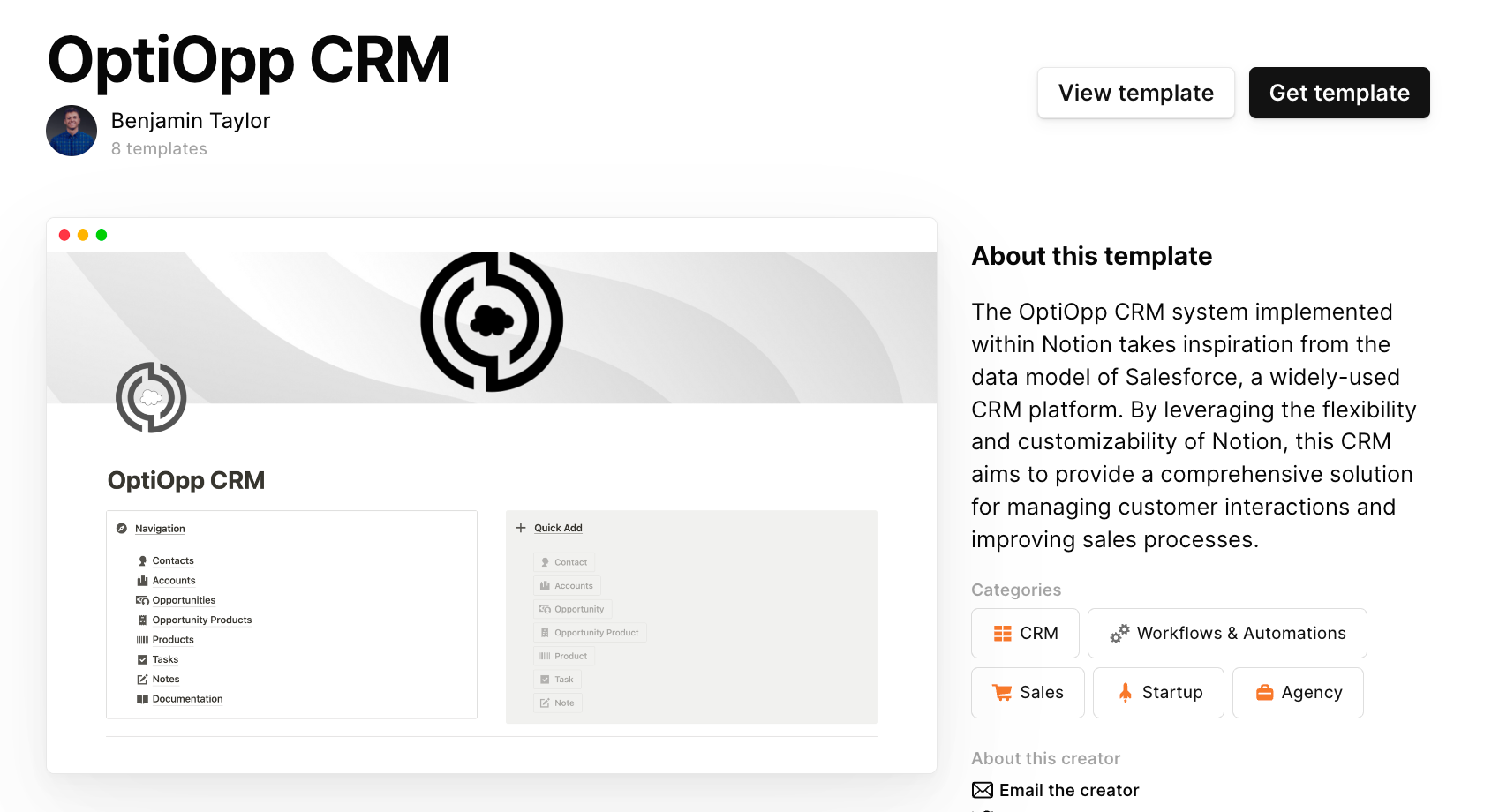
OptiOpp CRM is focused on optimizing opportunities for sales teams. It features a detailed pipeline management system that helps sales professionals track leads, manage deals, and analyze performance data to maximize sales efficiency.
By using these Notion CRM templates, you can organize your customer data, track leads, and streamline your sales processes more efficiently.
Whether you're a solopreneur, small business owner, or part of a larger organization, these templates can help you create a cohesive and unified CRM system on Notion.
How to Build a Notion CRM
Step 1. Choose the foundation
Decide whether to start with a blank slate or a template. While Notion’s flexibility allows for both approaches, we strongly suggest you start with one of the templates listed above.
For this tutorial, we’re going to use the example of a Sales CRM for B2B software (stick to what you know!), so Notion’s Sales CRM is the perfect starting point.
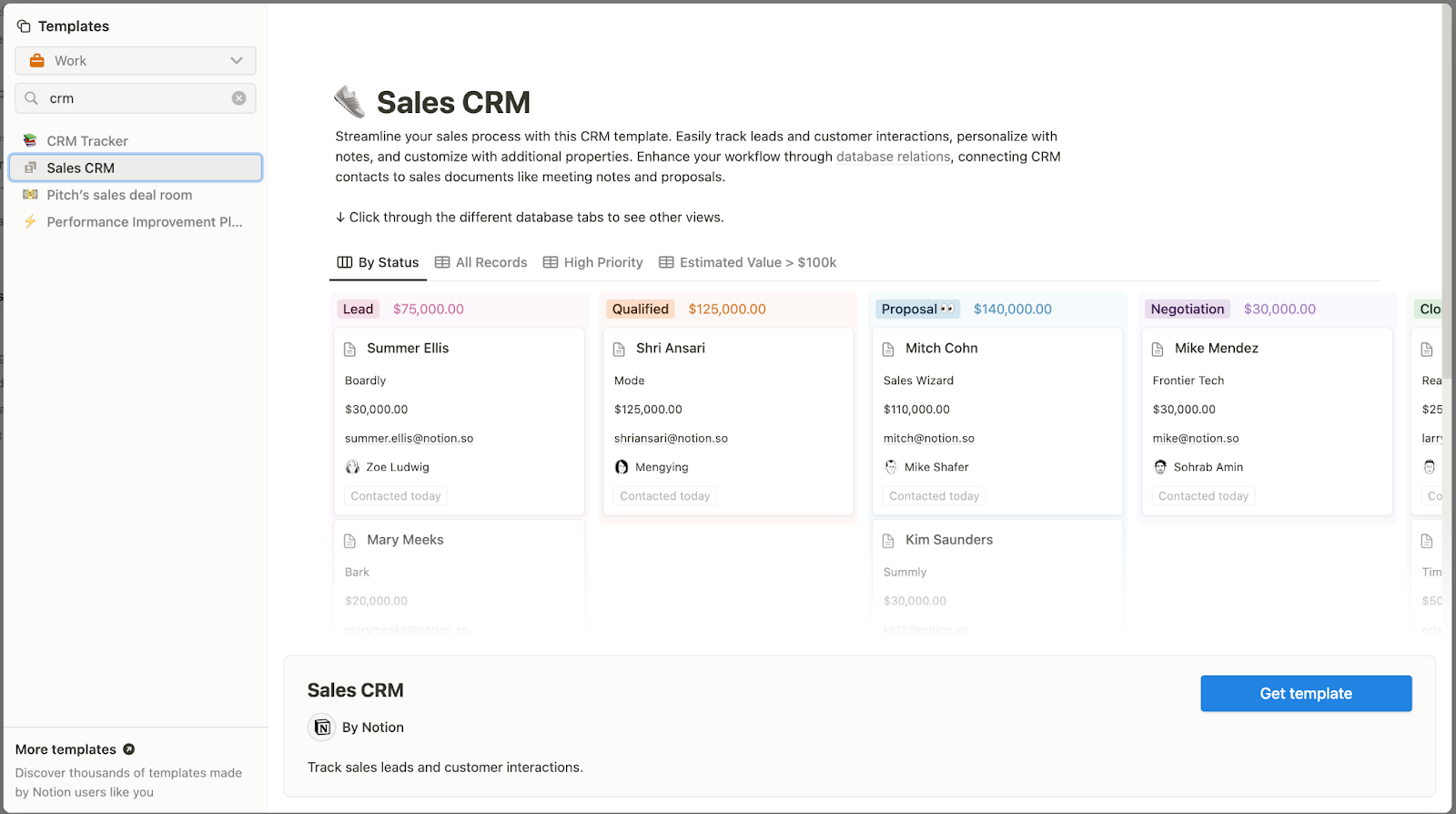
Step 2. Customize your database
Your database is the core of your CRM. It’s where all your customer information is stored. Add fields (properties) for contact details, interactions, deal stages, and any other relevant information.
Notion includes a range of properties, from text, and numbers, to multi-select tags and checkboxes, so you can capture each data point effectively.
The Sales CRM template provides a great baseline. But we’re going to adjust the status options, add a Lead ID for easier tracking, and remove a few fields we just don’t need.
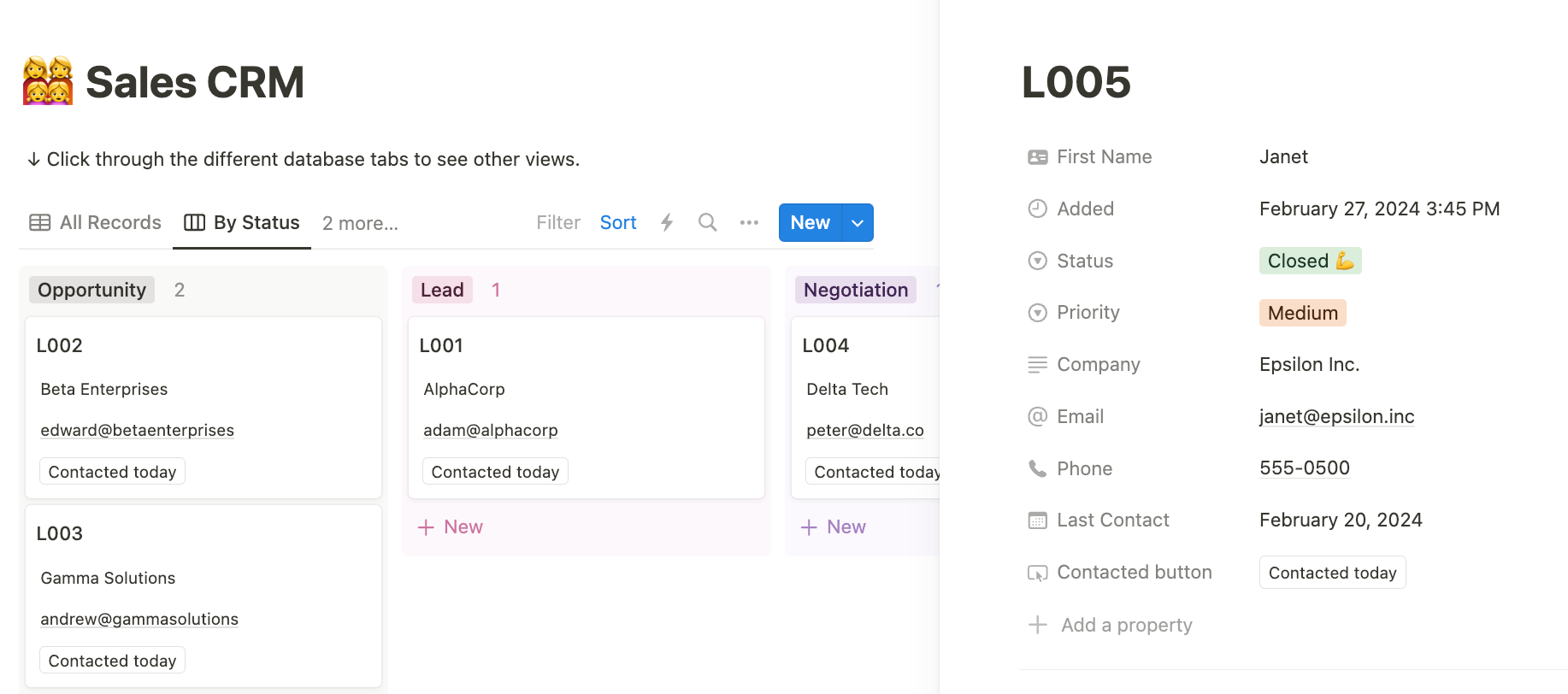
Step 3. Import your data
If transitioning from another system, import your existing data into Notion. Notion supports various import options—including text, markdown, and CSV files, which makes it easy to bring in customer data.
There’s always something lost in translation, though, so you’ll have to adjust the imported data to fit your newly created fields properly.
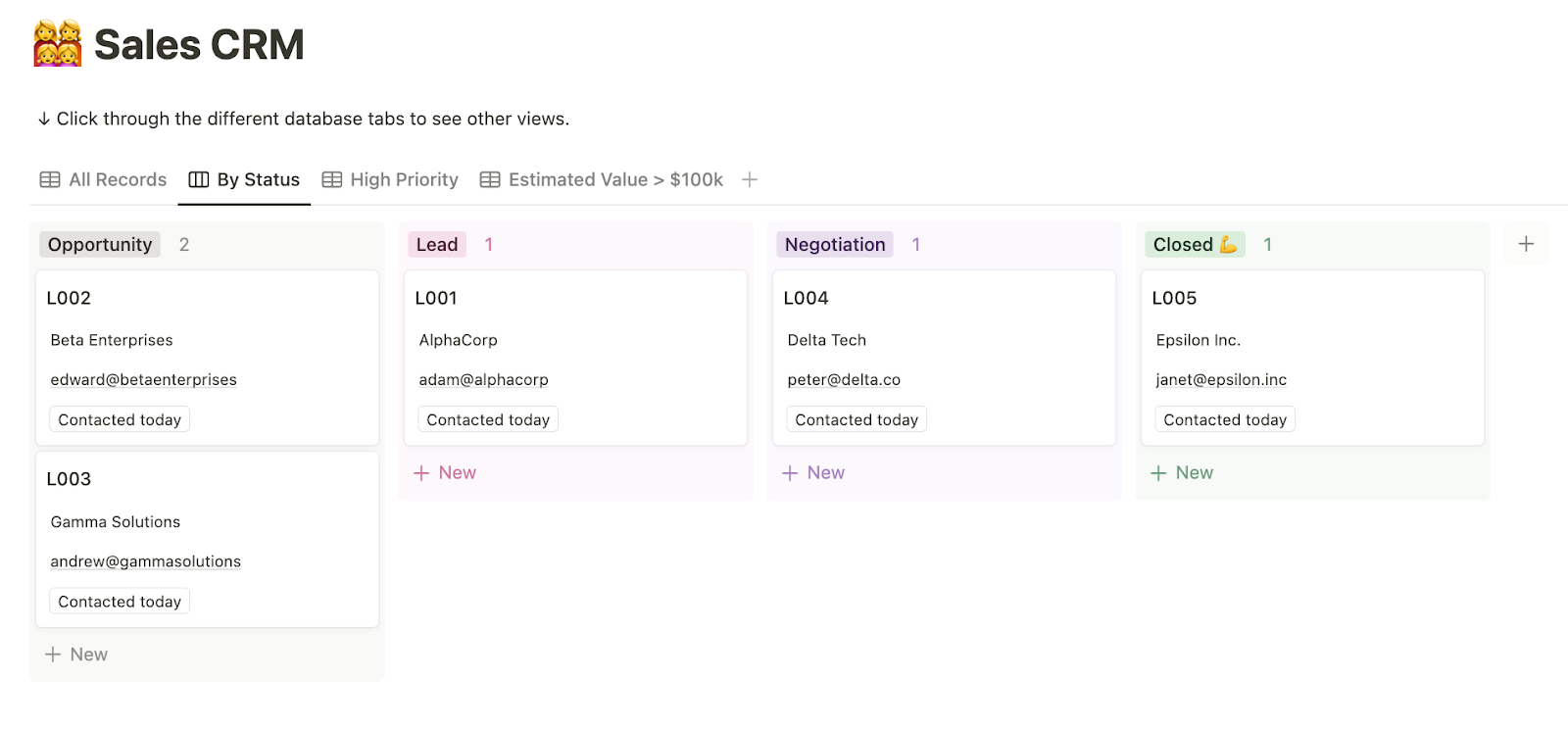
Step 4. Create the right views
Now it’s time to leverage Notion's ability to create multiple views for the same database. Like other similar tools (Airtable comes to mind), you can design views to suit different needs, such as:
- A Kanban board for visualizing deal stages.
- A Table view for a comprehensive list of all contacts.
- A Calendar view for tracking follow-ups and meetings.
- A Gallery view for a more visual approach
For our example, we’ve switched from the default Kanban view to the database view. You can have multiple views, though, so we’ve also set some up (e.g. via status, or priority).
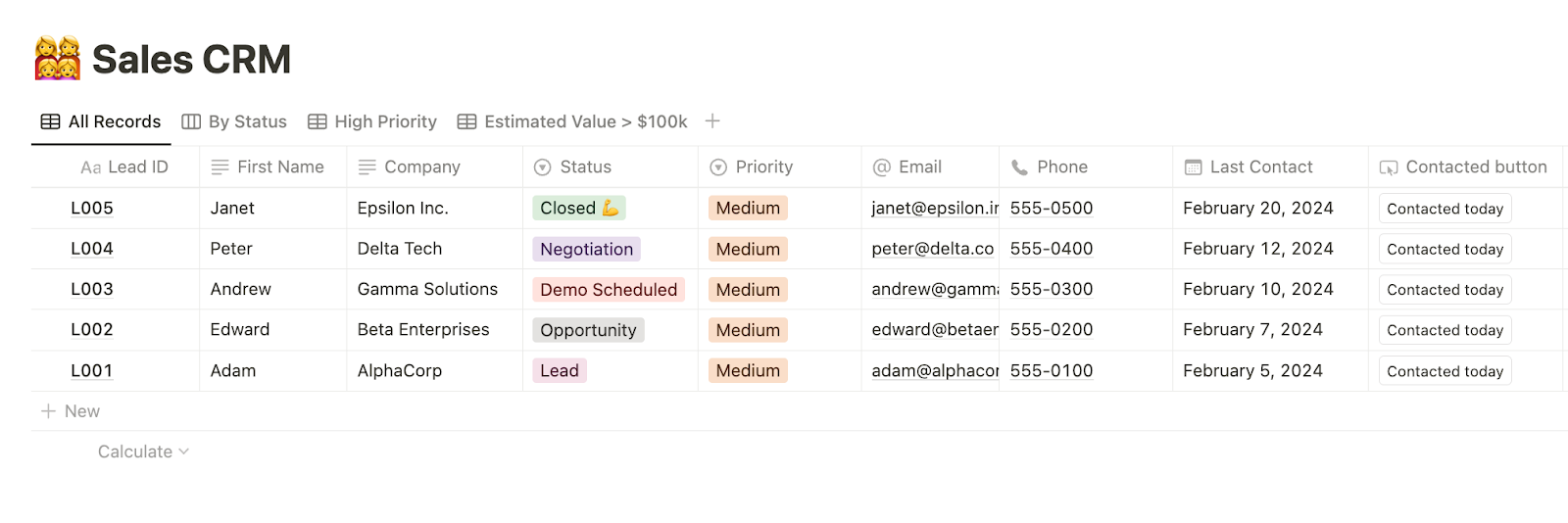
Step 5. Integrate with other tools
You’ve got your basic Notion CRM up and running! But to get the most out of it, you’re going to want to integrate with external tools using Notion’s built-in integrations, or a third-party platform like Relay.app.
This will help automate busywork like data entry, and syncing with calendars for follow-ups and also connect your CRM to the other tools in your tech stack.
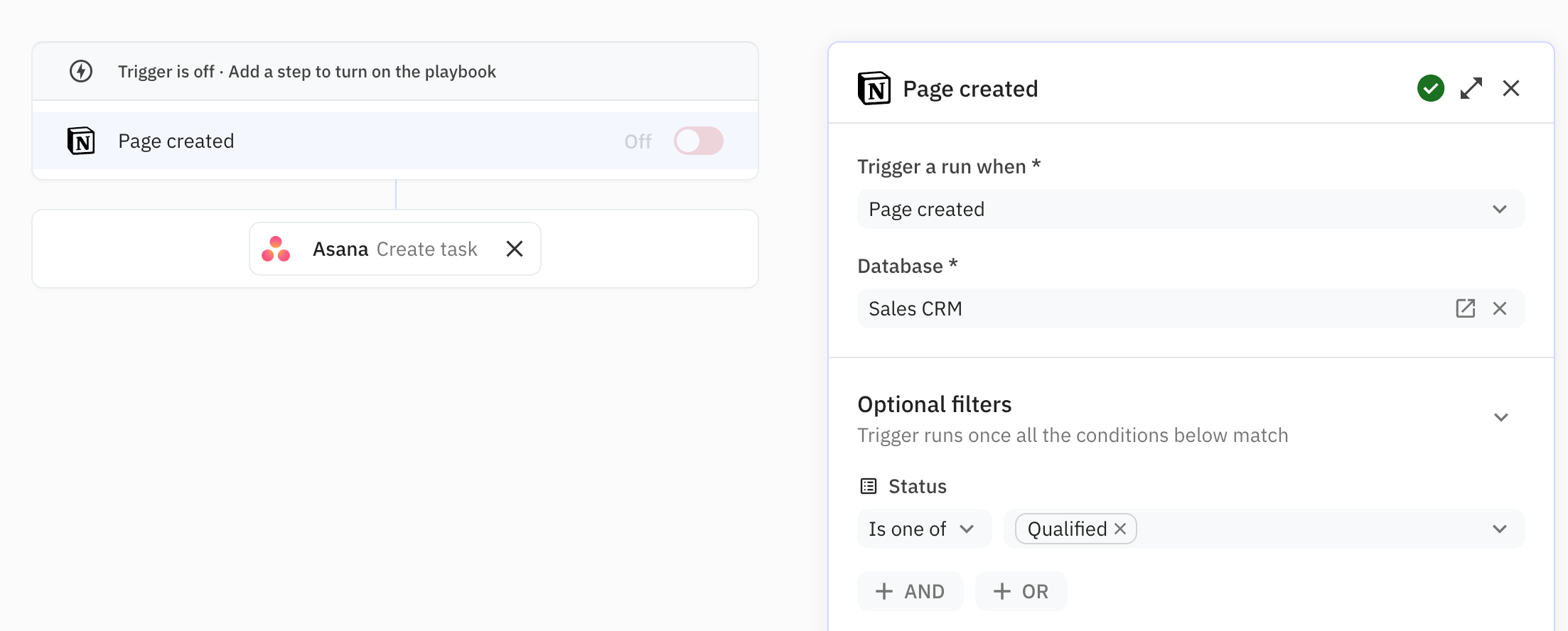
5 ways to automate your Notion CRM with Relay.app
Relay can transform your CRM into a more dynamic and proactive tool, streamlining operations, and offering deeper insights into your customer base. Here are some sample use cases:
1. Automate meeting management
When you schedule a new event in Calendly, Relay.app can automatically create a corresponding page in your Notion CRM.
This ensures you keep detailed records of each meeting, preparing you to manage follow-ups effectively and maintain continuity in your customer interactions.
Perfect for sales leaders, this automation means no detail is overlooked, and every meeting is accounted for directly in your CRM, enhancing your team’s ability to track progress and outcomes seamlessly.
2. Streamline data entry with forms
As a marketer, you can automate the addition of new Google Forms responses directly into your Notion database.
This integration captures customer feedback or inquiry data without manual entry, allowing you to respond quicker and track engagement trends more efficiently.
By automating this process, you ensure that valuable customer insights are immediately actionable, boosting your marketing efforts with timely and data-driven decisions.
3. Enhance project management
If you’re managing projects through Trello, Relay.app can create a new page in your Notion database for every new list added.
This helps you keep project documentation up-to-date and ensures seamless integration between task management and documentation.
It’s an ideal solution for project managers looking to bridge the gap between visual task planning and detailed project notes, providing a comprehensive overview of project statuses at a glance.
4. Improve internal communications
For team leads, automatically sending Slack direct messages for every new page added to your Notion database can streamline communications.
This ensures key updates or data entries are immediately shared, keeping the team aligned and responsive.
This automation is crucial for maintaining high levels of productivity and ensuring that all team members are promptly informed about updates, reducing bottlenecks and enhancing team synergy.


5. Centralize your data management
If you’re using Retable to manage data, Relay.app can sync new rows directly to your Notion database.
This is especially useful for operations managers looking to centralize information from various sources into one accessible, organized platform.
Integrating Retable with Notion through Relay.app not only simplifies the management of diverse data sets but also enhances analytical capabilities by providing a unified view of operational metrics.
Why choose Relay.app for CRM automation?
Relay.app enhances Notion CRM by automating key tasks and integrating with your tech stack to make your CRM a more dynamic tool.
What does that look like in practice? Here's a quick example:
When a new client fills out a contact form on your website, Relay.app can automatically capture that information and create a new client record in your Notion CRM.
Simultaneously, it can:
1. Schedule an introductory call using Calendly
2. Send a personalized welcome email via Gmail, and;
3. Set a task in Asana for the account manager to prepare for the first meeting.
This automation ensures that every step—from initial contact to task assignment—is handled efficiently, reducing manual entry and the potential for errors.
No manual data entry or mundane busywork!
Sounds great, right? And here are some more features that make Relay.app a must for Notion CRM automation:
- Automated data entry: Automatically captures information from web forms, emails, and social platforms directly into Notion, reducing manual entry.
- Seamless integrations: Connects Notion with a broad array of tools including Calendly, Gmail, Asana, and more for comprehensive workflow automation.
- Custom workflow design: Offers drag-and-drop interfaces to design and implement custom workflows without needing coding skills.
- Human-in-the-Loop: Incorporates manual checkpoints where necessary to ensure accuracy and personal touch in automation processes.
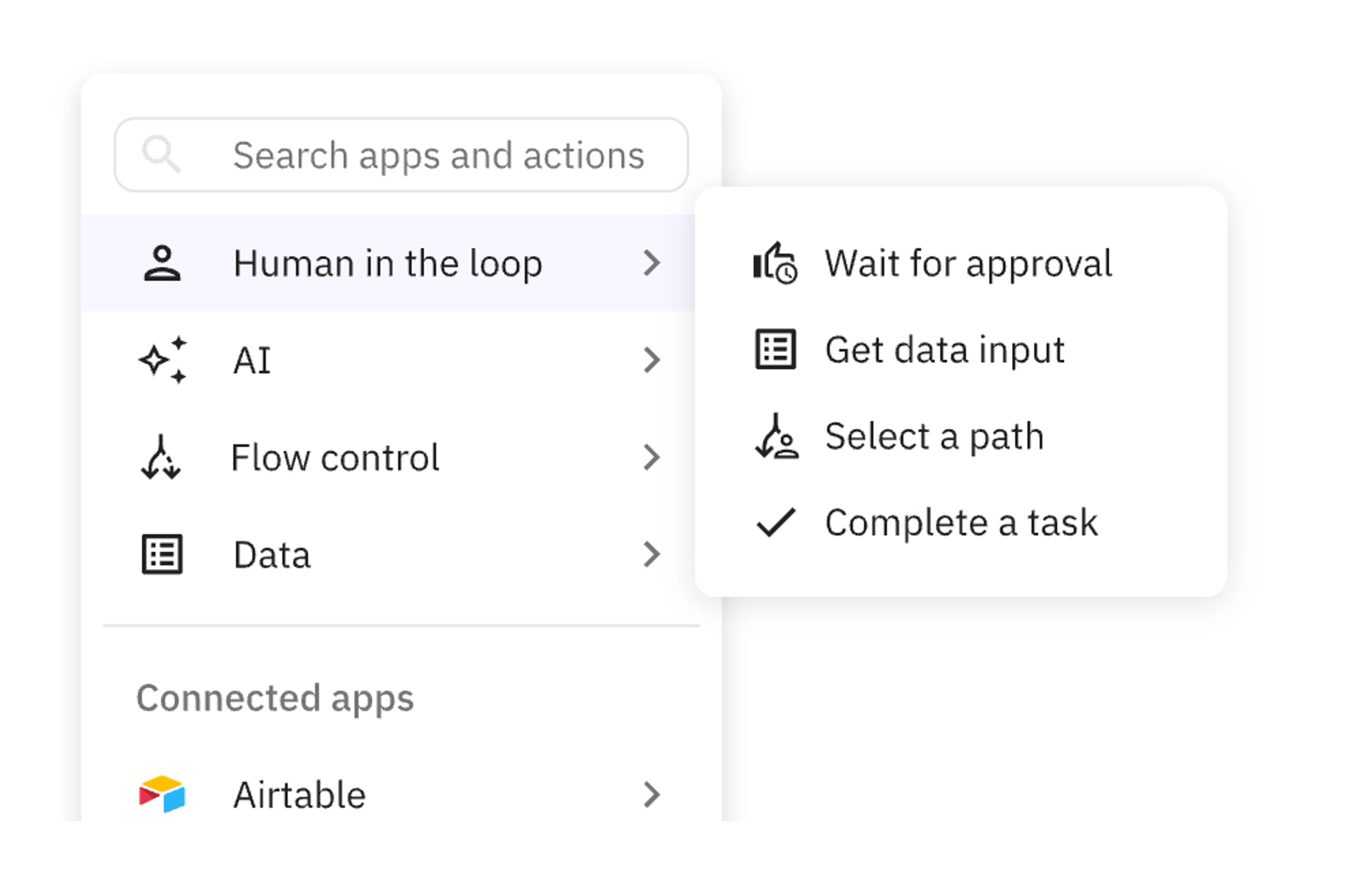
- In-line AI: Utilizes AI to automatically generate content, such as email summaries or client notes, enhancing the quality and efficiency of communications.
- Real-Time Synchronization: Keeps all your tools and databases in sync, ensuring that information is up-to-date and accurately reflected across all platforms.
- Multi-User Collaboration: Allows teams to collaboratively design and manage workflows, ensuring that everyone is on the same page.
Results? Faster data entry. Less context-switching. And more time to close those deals!
Automate your Notion CRM
By combining Notion's flexible platform with Relay's powerful automation and AI capabilities, you can create a CRM that not only manages your customer relationships but also enhances them.
It’s a setup that’s both powerful and surprisingly simple to manage.
Result? You more time to focus on what truly matters—building those relationships.
Ready to transform your customer management? Start with Notion, and let Relay do the heavy lifting.
Try Relay today and experience a smarter way to CRM.
__________________________________
Notion CRM FAQs
Can I use Notion for CRM?
Yes, Notion can be used as a CRM to manage customer relationships. It allows users to create customizable databases for tracking interactions, managing contacts, and organizing projects, making it a versatile tool for CRM purposes.
Is Notion a good sales CRM?
Notion can be effective as a sales CRM with its flexible customization options. It supports the creation of templates and databases that help in tracking leads, sales pipelines, and customer interactions, although it lacks some advanced CRM functionalities like automated marketing tools and integrated sales analytics.
What is the best CRM?
The best CRM depends on specific business needs. Salesforce and HubSpot are top choices for comprehensive CRM solutions offering extensive features for sales, marketing, and customer service. For simpler or more customizable options, platforms like Notion or Zoho CRM might be preferred.
What is a personal relationship manager in Notion?
A personal relationship manager in Notion refers to a customized setup within Notion where individuals can manage personal interactions, keep track of contacts, and organize communication histories. Users can leverage Notion's databases to store detailed notes, meeting dates, and relevant information about personal or professional relationships.
Is Notion 100% free?
Notion offers a free plan with basic features suitable for individual use, which includes unlimited pages and blocks, sharing with five guests, and syncing across devices. However, more advanced features, such as unlimited file uploads and team collaboration tools, are available through paid subscriptions.
Related reading:



